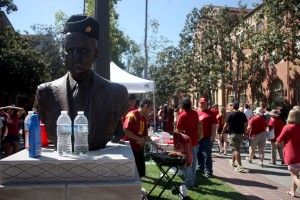USC will unveil new sustainability plan at tailgates
USC Athletics, the Office of Sustainability and Facilities Management Services announced a green on-campus tailgating initiative Wednesday. The effort will be instituted this Saturday before the season’s first football game.

Go green · The initiative will recognize tailgaters who recycle plates and cups instead of tossing them on the quad, the university said. – Jennifer Schultz | Daily Trojan
Halli Bovia, USC Sustainability’s program manager, said the Tailgate Waste Diversion and Education program aims to teach tailgaters the tools necessary to create a more environmentally friendly campus on game day.
“USC students are concerned about their environmental impact,” Bovia said. “We’re just giving them the opportunity to do the right thing.”
Bovia said nearly 65,000 visitors to the University Park Campus for football home games generate nearly 13 tons of waste per game.
The new program calls for student volunteers to walk around campus before the game to educate tailgaters on how to divert waste they have brought to campus and encourage them to recycle and compost appropriate materials. Volunteers will make recommendations on how to reduce waste in the future, such as asking tailgaters to bring food in bulk to reduce the amount of plastic packaging brought to campus and suggesting the use of only reusable cups and plates.
Hannah Wyatt, a junior majoring in cognitive science, said it might be difficult for tailgaters to break their habits and clean up after games.
“It’s an interesting idea, but I’m not sure how it’ll work out,” Wyatt said. “People have been set in their tailgating ways for a while. After a day tailgating and at a football game, people aren’t going to want to clean up after themselves.”
The program has also allowed for the creation of new, more visible recycling and compost bins, along with more signage and banners to aid in identifying them.
New sustainability efforts will also include a Zero Waste Tailgate Certification Program, which will recognize tailgaters who have pledged to divert a minimum of 90 percent of their waste at tailgates. Certifying certain tailgaters is meant to set an example for others, ultimately creating a more widespread impact on campus waste.
“The education program is about getting people to do the right thing with what they already brought [to campus]. The Zero Waste Tailgate Certification is meant to help them make better choices from the start,” Bovia said. “[Tailgating] is a great Trojan tradition. We’re just trying to make it more sustainable.”
Brittney Gross, a junior majoring in English, said even if the initiative isn’t successful, the effort counts.
“Even if it’s just one or two people participating, that’s better than none,” Gross said. “All you can do is try.”
